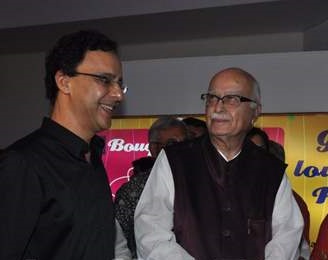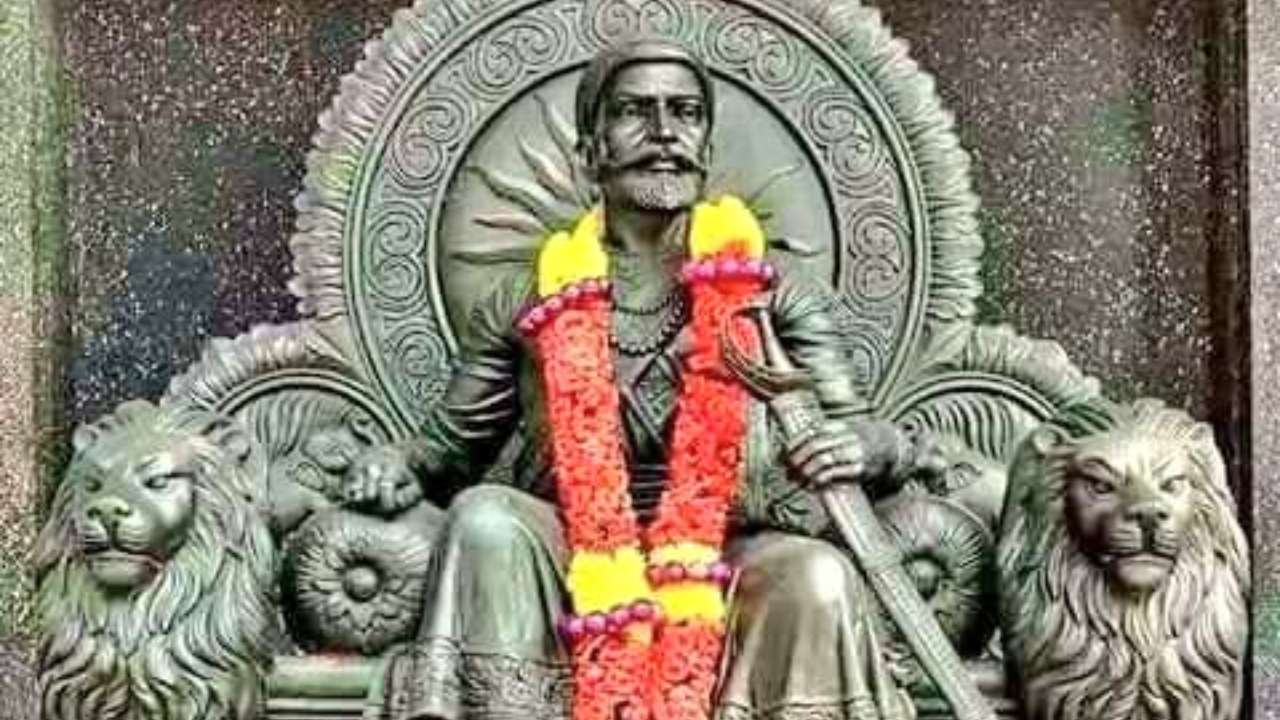Author’s Note: This is not an academic or objective essay; rather a personalised opinion on the recent Bharat Ratna awardee.
Lets begin with two excerpts:
First one:
Then out spake brave Horatius,
The Captain of the Gate:
“To every man upon this earth
Death cometh soon or late.
And how can man die better
Than facing fearful odds,
For the ashes of his fathers,
And the temples of his Gods.”
From Horatius by Thomas Babington Macaulay.
Second:
“Mardania! eh Ajudhia nagari Sri Ramchandra Ji ki hai. So, chal, iska darshan kari ”, which translates to: “Mardana! This Ayodhya city belongs to Sri Ramchandra Ji. So let us go for his darshan.”
From Bhai Man Singh’s Janam Sakhi which states that Guru Nanak visited Ayodhya.
Considering the aforementioned excerpts it is perhaps unsurprising that it was a Nanakapanthi Macaulayputra who charioted the movement to reclaim the birthplace of Lord Ram in Ayodhya and rebuild the Ram Temple. Additionally it was his organisational and political manoeuvring skills that shifted the political balance of India from the dominant secular leadership of the Congress party to the widely popular and ascendant Bharatiya Janata Party. It was for all that and many other activities that the current regime awarded him the land’s highest honour the Bharat Ratna. What made the moment more momentous was that it came days after the consecration of the Ram Temple in Ayodhya.
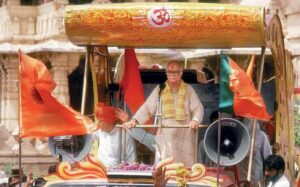
Though currently, the immensely popular Prime Minister Narendra Modi is synonymous with the BJP’s dominance across India’s political landscape, it was the Lal Krishna Advani who acted as one of the chief characters to shift the political levers of the country. Before proceeding further, it is necessary to give the reason behind his moniker – Nanakapanthi Macaulayputra.
LK Advani belonged to a Sindhi Amil Nanakpanthi family whose religious tradition “used to be Sikh rituals”, the holy book at his home being the Sri Guru Granth Sahib. He was educated at St. Patrick’s High School, Karachi, and by his own admission was unfamiliar with Hindi, preferring to speak his mother tongue Sindhi at home, while preferring English as functional language. Even his introduction to the so-called dreaded Rashtriya Swayamsevak Sangh was for lack of a better word, bourgeois one, in his own words:
During my vacation and before joining college, I started playing tennis. One of my regular partners on the tennis court was a friend, Murli Mukhi. One day, right in the middle of the game, he said, ‘I am going’. Utterly surprised, I asked him, ‘How can you go like this, without even completing the set?’ He replied, ‘I have joined the RSS a few days ago. I cannot be late for the shakha because punctuality is very important in that organisation’.
A contextual point to mention here would be the view that the RSS also had certain inspirations behind it. Many scholars quote contemporary accounts about how senior political figures of the early 20th Century like Madan Mohan Malviya and Dr Moonje wanted an organisation fashioned after the British boy scout and army, including but not limited to their marching songs. The RSS march as seen today was inspired by that of British voluntary forces in areas of trouble to warn citizens. Supposedly Sangh leaders borrowed English tunes to train the RSS band. The aforementioned figures, besides celebrating native heroic legends like Chhatrapati Shivaji Maharaj and Peshwa Baji Rao, also stated that Indians had to develop patriotism the way the British developed theirs. Important wars fought by the British like the Battle of Waterloo and Trafalgar were given as examples.
Considering this scenario, it is not strange for a moderate Macaulayputra like LK Advani to familiarise himself with the organisation. Thus he joined the RSS in 1942 besides attending discourses on the Bhagavad Gita by Swami Ranganathananda the president of the Karachi centre of Ramakrishna Mission. This shows Advani to be the recipient of the Indian, rather Indo-Anglian renaissance that swept British India from 1850’s to 1930’s. Couple that with his Amil Nanakpanthi family roots which is the recipient of Bhakti movement.
Also lesser known is the fact that he was related to famed Sufi poetess Dadi Ganga , in fact Advani mentions in his memoirs that his wife Kamla along with her sister Sarla published Dadi Ganga’s Sufi poetry. All these make him the ideal reformist as opposed to the Hindu hardliner the media likes to portray him as; or would it be a leap of faith to say in certain cases, Hindu hardliner is the ideal reformist.
The leap can be taken considering how he organised the political networks connecting the BJP to figures stretching from fiery socialist George Fernandes to Shiv Sena supremo Balasaheb Thackeray.
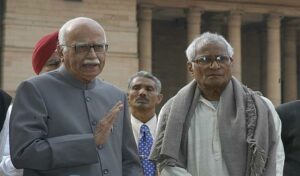
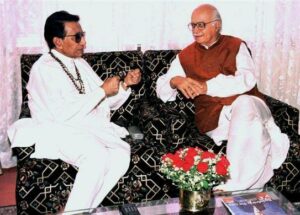
Besides political networking, what is less spoken about Advani (maybe intentionally) is his penchant for films and the filmmakers. As stated by Vidhu Vinod Chopra whose An Encounter with Faces was nominated for the Academy Award under Best Documentary Short Film in 1979:
“When I got nominated for an Oscar I had no money, I had nothing and I read in the paper that I was nominated. He gave me an Air India ticket and $ 20 a day and that I owe it to Mr LK Advani. I want the world to know why he is so special to me. Not because he is a politician but because he is the man who sent me to the Oscars.”
On multiple occasions other Hindutva icons like Atal Bihari Vajpayee and Balasaheb Thackeray have been lauded as poets and artists, but Advani as the admiring film buff has been less talked of. Be that as it may, 2024 can be now seen as honouring a Nanakpanthi Macaulayputra who charioted a saffron trail across India’s political landscape and who also liked going to the movies.
The essay has been published in the following blog as well.
